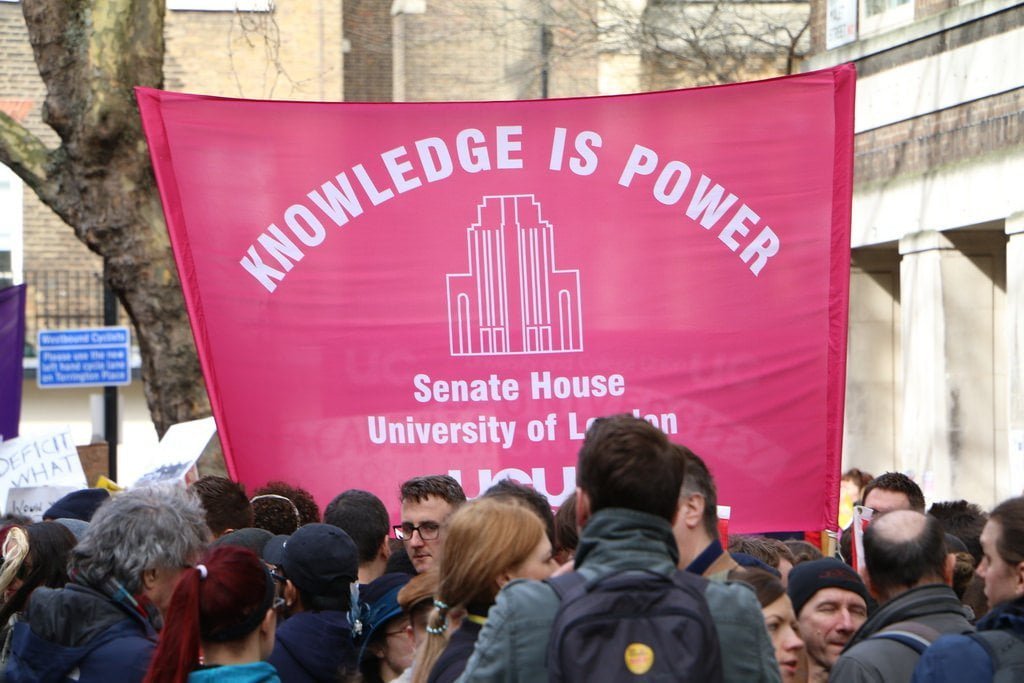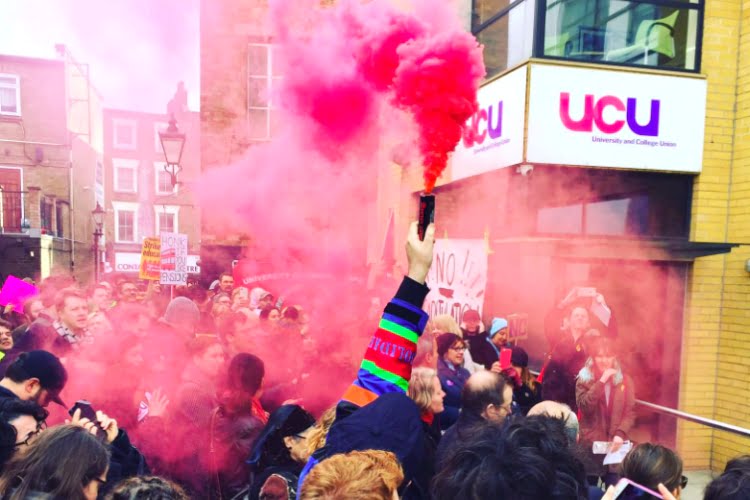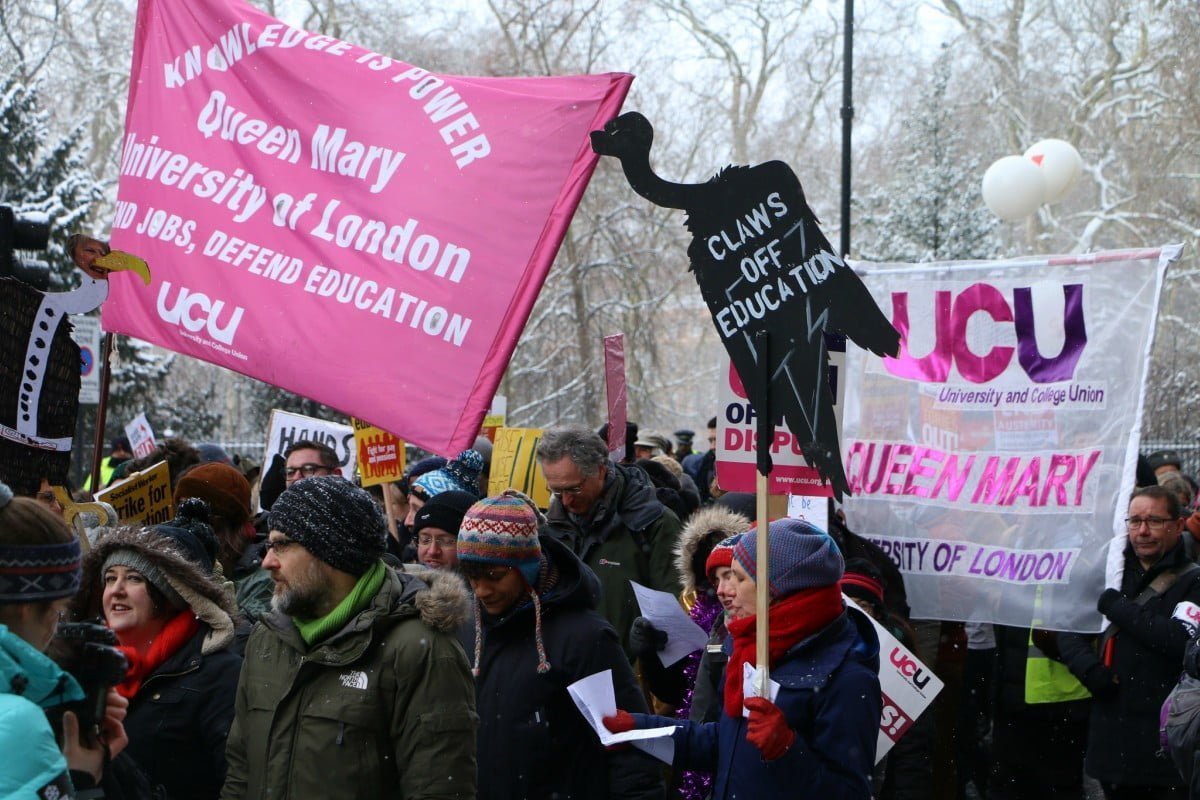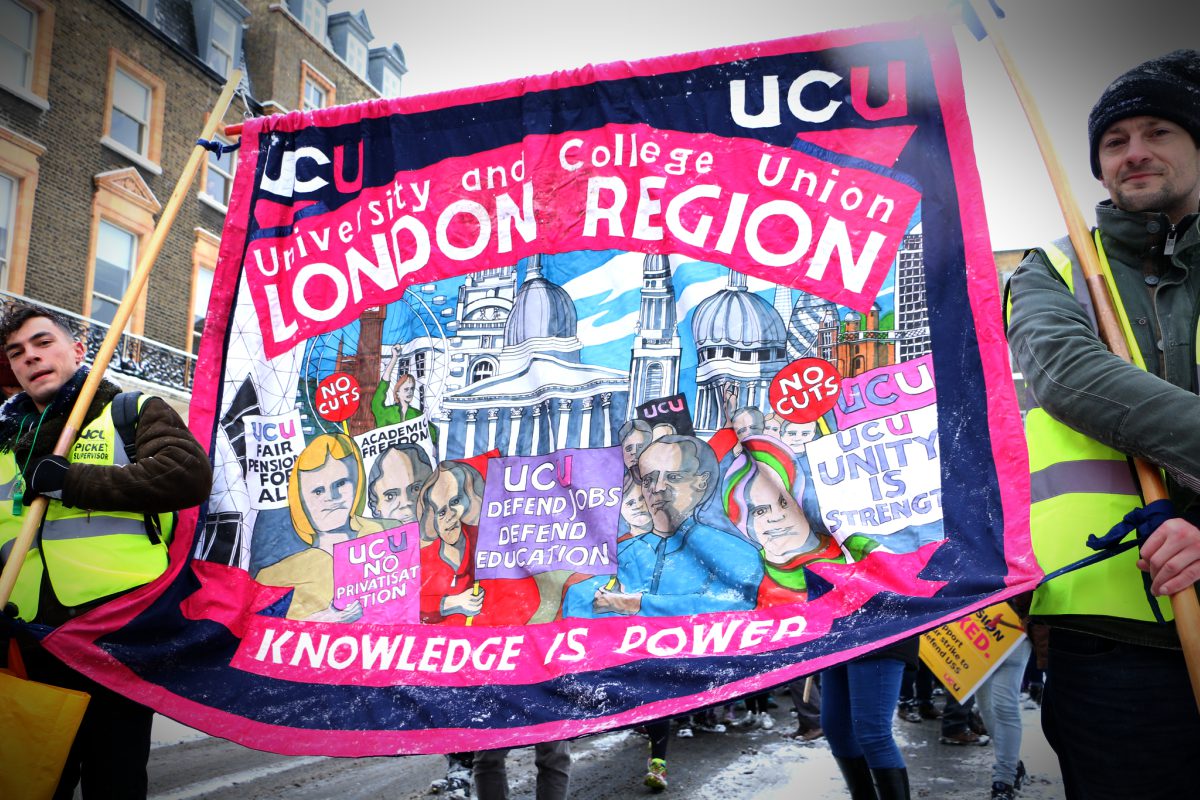The battle between UCU members and their leadership raged on as the union’s 2018 congress entered its third and final day.
Sally Hunt, the UCU general secretary, has spent this year’s UCU congress attempting to maintain her position at all costs. Delegates have witnessed the union tops employing slander, intimidation and emotional blackmail to get their way.
When that didn’t work, the leadership resorted to bureaucratic procedures. When that didn’t work, they made up the rules as they went along. When that still didn’t work, they walked out.
Back-room shenanigans
Business ended on Wednesday with union officials (represented by Unite the Union) entering into an official trade dispute with UCU congress over a pair of motions (10 and 11). These called, respectively, for a vote of no confidence in Hunt and censure for the union leadership’s conduct during the pensions strike.
The right-wing faction (centred around the Independent Broad Left) had already twice brought the congress to a standstill by walking out, thus preventing the motions from being democratically debated. They went on to picket their own congress, declaring a trade dispute against the UCU.
The day ended with no resolution, despite a majority vote to hear the motions in question.
On Thursday, the leadership had a reprieve, as separate commissions were held on Higher and Further Education policy. Meanwhile, Hunt’s faction attempted to stitch-up a deal with the motion proposers behind the scenes.
A statement by the King’s College London delegation (who proposed the censure) revealed they were quietly urged to “do what’s good for the union” and drop their motion. They were told a censure “might jeopardise the livelihood of paid officials’ children, and their ability to pay their mortgages; that it might lead to legal action and that it threatens the unity of our union at a time when ‘UUK is watching us’”.
The union leadership and their supporters denounced “ultra-left elements in the union”, asserting that attacks on Hunt “only do damage” to the union by creating “negative publicity in the media”. But it is our union leaders and their behaviour that have created “negative publicity”, not the democratic actions of ordinary delegates.
Many ordinary members took the opportunity to voice their anger online, with one first time delegate tweeting:
“New members like me don’t care about antiquated factional nonsense. We just want good representation, on important issues like casualisation, & a healthy respect for democracy. If the leaders can’t do that, find new ones.”
Condemnation
 On Friday, Unite and the UCU NEC released a joint statement, claiming that a no confidence motion and official reprimand were employment issues, amounting to unfair dismissal and rebuke without due process, and ‘advising’ congress to drop the matter and dump motions 10 and 11.
On Friday, Unite and the UCU NEC released a joint statement, claiming that a no confidence motion and official reprimand were employment issues, amounting to unfair dismissal and rebuke without due process, and ‘advising’ congress to drop the matter and dump motions 10 and 11.
In response, congress overwhelmingly passed an emergency motion condemning the antics of the leadership on Wednesday, asserting the right of congress to criticise elected officials, and insisting the motions be debated. This put the union leaders in a tricky spot.
When the time came to hear motion 10, UCU president and chair Joanna de Groot demanded another vote on hearing the motions given the “new context” (a veiled reference to the statement from the NEC and Unite). This time, she argued a two-thirds majority was required.
However, delegates shot this down, pointing out there was no constitutional basis for a two-thirds majority – especially when members had already voted on four separate occasions to hear the motions: at the branches proposing them; with the Congress Business Committee ruling them in order; in the vote on Wednesday; and with the late motion passed on Friday.
Before the vote, UCU vice-president Douglas Chalmers pleaded with delegates to reconsider, citing the principles of “due process” and “natural justice”. In this case, apparently these terms mean a general secretary’s unalienable right to be immune from all criticism.
When congress voted by an increased majority to hear the motions, the union officials and their supporters walked out for a third time, resulting in a 30-minute suspension that ran into lunch.
No confidence
 When their time elapsed, the right-wing faction still refused to re-enter the congress. With the room no longer quorate and without even a PA system (which was under the control of the conference organisers, who had walked out and refused to turn the microphones back on), confusion prevailed. People became frustrated and started to file out.
When their time elapsed, the right-wing faction still refused to re-enter the congress. With the room no longer quorate and without even a PA system (which was under the control of the conference organisers, who had walked out and refused to turn the microphones back on), confusion prevailed. People became frustrated and started to file out.
In the end, it was decided that the matter be postponed to a one-day recall conference in a month’s time. This extra conference had already been agreed upon in order to hear policy left undiscussed due to the disrupted congress. Delegates agreed to put out a statement to the membership and hold mass meetings across the UK in the days ahead.
Hunt will now likely leverage her control of the national mailing list to drum up support with the more atomised, less active layers amongst the wider membership – no doubt decrying the “bullying” and “unfair treatment” she endured from congress delegates.
However, even this might not be enough to save Hunt’s skin. Members who formerly supported her have already vocally expressed their disgust at her behaviour. There are already calls for the UCU leader to go for bringing the union into disrepute. One of the final speakers of the congress (before business was prematurely ended), for example, made a speech to this effect.
The task now is for union delegates and activists to go back to their areas and explain to grassroots members the scandal that has taken place at this congress. Mass meetings should be built for locally, with motions of no confidence in the leadership presented and passed at branches across the country.
In this way, activists can win over the more inert layers of the union and build support amongst rank-and-file members for a new, fighting leadership. Then we can return to the recall conference with a mandate to kick out the current leaders and transform the union from top-to-bottom.
For a member-led union
 As was said many times during the congress, with these shenanigans, the union tops have demonstrated their capacity to organise bold and effective action – but only against the members who elected them.
As was said many times during the congress, with these shenanigans, the union tops have demonstrated their capacity to organise bold and effective action – but only against the members who elected them.
Our elected leaders should represent our movement. They should be answerable to the will of union members, subject to democratic recall. And they should only be on the average wage of those they represent, to ensure they genuinely represent ordinary members’ interests.
It was notable that many of the most passionate speakers against Hunt were younger. These were first-time delegates brought into activity by the strike. They will surely be appalled at the behaviour of the general secretary on display at this congress.
But rather than being demoralised – or following the advice being given from some quarters to abandon the union in frustration – they should harness the anger resulting from this debacle and fight to change the UCU into a radical, fighting union.
We need to democratise our union. But that alone is not enough. We also need bold socialist demands that can address the needs of education workers and students.
In advance of the recall conference, therefore, the new active layers in the union should organise to call for a leadership that will fight for a fundamental change in our education sector – and across wider society.






